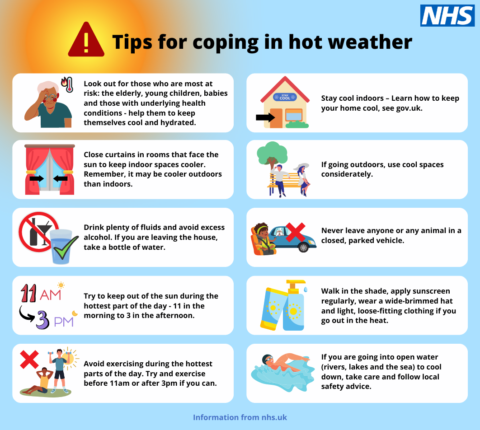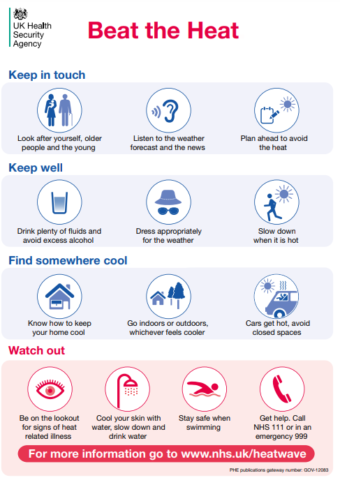
The Heatwave and Summer preparedness programme, overseen by Public Health England have sent through these handy resources in order to help you keep safe and cool during the hot Summer period.
We know that hot weather and the heat can affect anyone, but some people run a greater risk of serious harm. Remember to think of those who may be more at risk from the effects of heat – these include the following:
- older people, especially those over 75
- babies and young children
- people with a serious chronic condition, particularly dementia, heart, breathing or mobility problems
- people with serious mental health problems
- people on certain medications, including those that affect sweating and temperature control (for example, diuretics, antihistamines, beta-blockers and antipsychotics
- people who are already ill and dehydrated (for example, from gastroenteritis)
- people who misuse alcohol or drugs
- people who are physically active (for example, soldiers, athletes, hikers and manual workers)
- homeless people ()
Air pollution: this can become worse during periods of hot weather and affect those with heart and/or lung problems. Information on the latest pollution levels, the air quality forecast and health advice can be found on the UK-AIR website or call 0800 55 66 77
Check out the Summer health useful links below:
- Beat the Heat: Staying safe in the hot weather
- Sun, UV and cancer
- hot weather and health: guidance and advice
- Supporting vulnerable people
- How to get vitamin D from sunlight
- UK-AIR – health advice about those who may be particularly sensitive to air pollution. or call 0800 55 66 77
- Stay gas safe this summer
- Water safety advice
- Window safety for children
- Frimley water and video safety video for you and your family (YouTube) – can be used for Drowning Prevention Week (19th to 26th June 2021)
- Keep your Kids safe this Summer
- Stay Hydrated
- How to cope in hot weather
- NHS Heat exhaustion and heatstroke
- Summer Pet Safety Tips

If you want more information about how hot weather can affect your health please visit www.nhs.uk. If you are concerned about your health or somebody you care for, advice can be obtained from NHS 111 or your local pharmacist.

